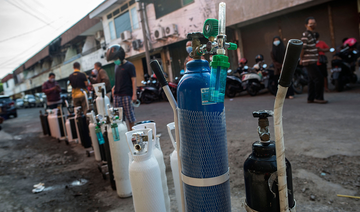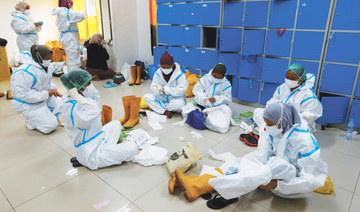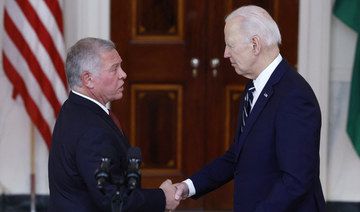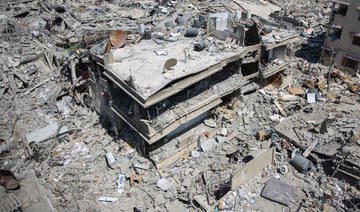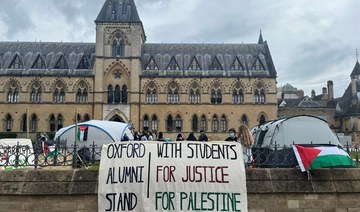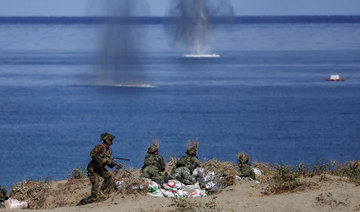JAKARTA: Muslims across Indonesia marked a grim Eid Al-Adha festival for a second year Tuesday as the country struggles to cope with a devastating new wave of coronavirus cases and the government has banned large gatherings and toughened travel restrictions.
Indonesia is now Asia’s COVID-19 hot spot with the most confirmed daily cases, as infections and deaths have surged over the past three weeks and India’s massive outbreak has waned.
Most of Indonesia’s cases are on the densely populated island of Java, where more than half of the country’s 270 million people live. Authorities in the world’s most populous Muslim-majority nation have banned many of the crowd-attracting activities that are usually part of Eid Al-Adha, the Feast of Sacrifice that marks the end of the annual Muslim pilgrimage to Makkah.
Authorities allowed prayers at local mosques in low-risk areas, but elsewhere houses of worship had no congregations, including Jakarta’s Istiqlal Grand Mosque, the largest in Southeast Asia.
Officials also banned the huge crowds that usually fill the yards of mosques to participate in ritual animal slaughter for the festival. Religious leaders urged the faithful to pray inside their homes and children were told to not go out to meet friends.
Indonesia’s health ministry reported 34,257 new coronavirus cases and 1,338 deaths on Monday, making it the country’s deadliest day since the start of the pandemic.
COVID-19 infections in Indonesia are at their peak last week with the highest daily average reported at more than 50,000 new infections each day. Until mid-June, daily cases had been running at about 8,000.
Overall, Indonesia has reported more than 2.9 million cases and 74,920 fatalities. Those figures are widely believed to be a vast undercount due to low testing and poor tracing measures.
The government put emergency restrictions in place on July 3 across Java island and the tourist island of Bali, limiting all nonessential travel and gatherings and shutting malls, places of worship and entertainment centers. They were set to end on Tuesday in time for the country to celebrate Eid Al-Adha.
But with the wave of infections still expanding, the government’s COVID-19task force issued a special directive for the holiday week that bans all public travel, communal prayers, family visits and gatherings across Java and Bali, and expanded the lockdown measures to 15 cities and districts outside the two islands that have recorded sharp increases in COVID-19 cases.
President Joko Widodo appealed to Muslims to perform Eid prayers and recitation of God is great at home with their families.
“In the midst of the current pandemic, we need to be willing to sacrifice even more,” Widodo told televised remarks on the eve of Eid. “Sacrificing personal interests and putting the interests of the community and others first,” he said.
Police set up highway checkpoints and blocked main roads for non-essential vehicles. Domestic flights and other modes of transportation were suspended, blocking people from making traditional family visits.
“This is unfair ... but we should follow for the sake of people’s safety,” said Eka Cahya Pratama, a civil servant in the capital, Jakarta. He said he has lost many relatives because of COVID-19, including his aunt and two uncles.
“I feel really sad, I really miss them on the day of Eid,” he said.
Indonesia’s current wave was fueled by travel during the Eid Al-Fitr festival in May and by the rapid spread of the more contagious delta variant that emerged in India. Hospitals are swamped and oxygen supplies are running out, with growing numbers of the ill dying in isolation at home or while waiting to receive emergency care.
With the health care system struggling to cope, even patients fortunate enough to get a hospital bed are not guaranteed oxygen.
Other Asian countries are also struggling to contain rapidly rising infections amid sluggish vaccination campaigns and the spread of the delta variant. Among them are Muslim-majority places like Malaysia, Bangladesh and the southernmost four provinces of Thailand.
Unlike Indonesia’s restrictions, Bangladesh controversially paused its coronavirus lockdown for eight days to mark Eid Al-Adha, and its millions of people are shopping and traveling this week, raising fears the holiday will cause a virus surge that will collapse its already-struggling health care system.
Malaysia also has struggled to control its outbreak, which has worsened despite being under a lockdown since June 1. Total cases have soared by 62 percent since June 1 to above 927,000. Hospitals, especially in the state of Selangor, have been overwhelmed, with some patients reportedly being treated on the floor due to a lack of beds, and corpses piling up in mortuaries. Vaccinations, however, have picked up, with nearly 15 percent of the population now fully inoculated.
Malaysian Prime Minister Muhyiddin Yassin urged Muslims to stay home and celebrate the holiday modestly. “I appeal to you all to be patient and abide by the rules because your sacrifice is a great jihad in Allah’s sight and in our effort to save lives,” he said in a televised speech on the eve of the festival.
Indonesia began vaccinating aggressively earlier than many countries in Southeast Asia. About 14 percent of its population have had at least one dose, primarily China’s Sinovac. But that may leave them susceptible, since Sinovac may be less effective against the delta variant. Both Indonesia and Thailand are planning booster shots of other vaccines for their Sinovac-immunized health workers.
In Indonesia, land continues to be cleared for the dead as daily burials at dedicated graveyards for COVID-19 victims have increased 10-fold since May in Jakarta alone, according to government data.
Families wait turns to bury their loved ones as gravediggers work late shifts. Last year, Indonesia’s highest Islamic clerical body issued a decree that mass graves — normally forbidden in Islam — would be permitted during the pandemic.
Indonesian Muslims mark grim Eid amid devastating virus wave
https://arab.news/jwpbb
Indonesian Muslims mark grim Eid amid devastating virus wave
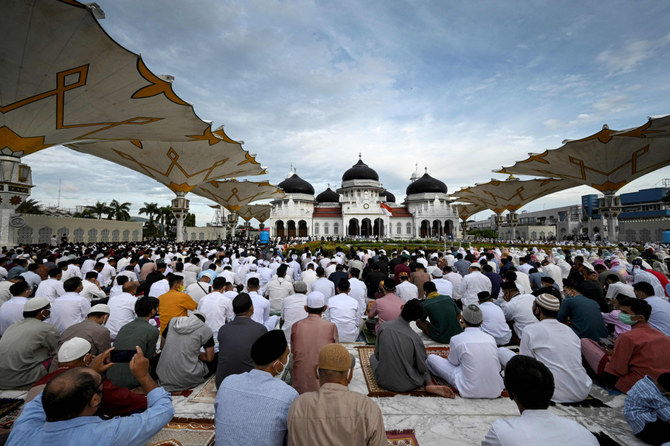
- Most of Indonesia’s cases are on the densely populated island of Java, where more than half of the country’s 270 million people live
Columbia University cancels main commencement after weeks of pro-Palestinian protests
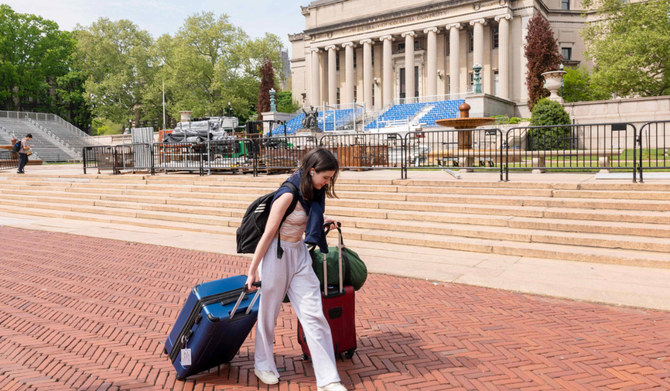
- Israel has killed more than 34,600 Palestinians, about two-thirds of them women and children, according to the Health Ministry in the Hamas-ruled territory
- Similar encampments sprouted up elsewhere as universities struggled with where to draw the line between allowing free expression while maintaining safe and inclusive campuses
NEW YORK: Columbia University canceled its large university-wide commencement ceremony Monday following weeks of pro-Palestinian protests that have roiled its campus and others across the US, but said students will still be able to celebrate at a series of smaller, school-based ceremonies this week and next.
The decision comes as universities around the country wrangle with how to handle commencements for students whose high school graduations were derailed by COVID-19 in 2020. Another campus shaken by protests, Emory University, announced Monday that it would move its commencement from its Atlanta campus to a suburban arena. Others, including the University of Michigan, Indiana University and Northeastern, have pulled off ceremonies with few disruptions.
Columbia’s decision to cancel its main ceremonies scheduled for May 15 saves its president, Minouche Shafik, from having to deliver a commencement address in the same part of campus where police dismantled a protest encampment last week. The Ivy League school in upper Manhattan said it made the decision after discussions with students.
“Our students emphasized that these smaller-scale, school-based celebrations are most meaningful to them and their families,” officials said.
Most of the ceremonies that had been scheduled for the south lawn of the main campus, where encampments were taken down last week, will take place about 5 miles (8 kilometers) north at Columbia’s sports complex, officials said.
Speakers at some of Columbia’s still-scheduled graduation ceremonies include Pulitzer Prize-winning playwright James Ijames and Dr. Monica Bertagnolli, director of the National Institutes of Health.
Columbia had already canceled in-person classes. More than 200 pro-Palestinian demonstrators who had camped out on Columbia’s green or occupied an academic building were arrested in recent weeks.
Similar encampments sprouted up elsewhere as universities struggled with where to draw the line between allowing free expression while maintaining safe and inclusive campuses.
The University of Southern California earlier canceled its main graduation ceremony. Students abandoned their camp at USC on Sunday after being surrounded by police and threatened with arrest.
Other universities have held graduation ceremonies with beefed-up security. The University of Michigan’s ceremony was interrupted by chanting a few times Saturday. In Boston on Sunday, some students waved small Palestinian or Israeli flags at Northeastern University’s commencement in Fenway Park.
Emory’s ceremonies scheduled for May 13 will be held at the GasSouth Arena and Convocation Center in Duluth, almost 20 miles (30 kilometers) northeast of the university’s Atlanta campus, President Gregory Fenves said in an open letter.
“Please know that this decision was not taken lightly,” Fenves wrote. “It was made in close consultation with the Emory Police Department, security advisers and other agencies — each of which advised against holding commencement events on our campuses.”
The 16,000-student university is one of many that has seen repeated protests stemming from the conflict that started Oct. 7 when Hamas militants attacked southern Israel, killing about 1,200 people, mostly civilians, and taking roughly 250 hostages. Student protesters are calling on their schools to divest from companies that do business with Israel or otherwise contribute to the war effort.
Vowing to destroy Hamas, Israel launched an offensive in Gaza that has killed more than 34,500 Palestinians, about two-thirds of them women and children, according to the Health Ministry in the Hamas-ruled territory. Israeli strikes have devastated the enclave and displaced most of its inhabitants.
Hamas on Monday announced its acceptance of an Egyptian-Qatari ceasefire proposal, but Israel said the deal did not meet its “core demands” and that it was pushing ahead with an assault on the southern Gaza town of Rafah.
“Ceasefires are temporary,” said Selina Al-Shihabi, a Georgetown University sophomore who was taking part in a protest at George Washington. “There can be a ceasefire, but the US government will continue to arm the Israeli military. We plan to be here until the university divests or until they drag us out of here.”
Also Monday, the University of California, Los Angeles, alerted students that all classes were moving online due to ongoing disruptions following the dismantling of a pro-Palestinian encampment last week. The university police force reported 44 arrests but there were no specific details, UCLA spokesperson Eddie North-Hager said in an email to The Associated Press.
At the University of California, San Diego, police cleared a pro-Palestinian encampment and arrested more than 64 people, The San Diego Union-Tribune reported.
Schools are trying various tactics from appeasement to threats of disciplinary action to get protesters to take down encampments or move to campus areas where demonstrations would be less intrusive.
The School of the Art Institute of Chicago said in a Facebook post Sunday that it offered protesters “amnesty from academic sanction and trespassing charges” if they moved.
“Many protesters left the premises of their own accord after being notified by the police that they were trespassing and subject to arrest,” the school said. “Those that remained were arrested after multiple warnings to leave, including some of whom we recognized as SAIC students.”
A group of faculty and staff members at University of North Carolina at Chapel Hill asked the administration for amnesty for any students who were arrested and suspended during recent protests. UNC Faculty and Staff for Justice in Palestine said in a media advisory that it would deliver a letter on behalf of more than 500 faculty who support the student activists.
Other universities took a different approach.
Harvard University’s interim president, Alan Garber, warned student’s that those participating in a pro-Palestinian encampment in Harvard Yard could face “involuntary leave.” That means they may would not be allowed on campus, could lose their student housing and may not be able to take exams, Garber said.
At the Massachusetts Institute of Technology, police restricted access to an encampment after a school deadline for them to leave had passed. About 200 protesters gathered outside the camp, chanting, “MIT can’t you see? Palestine will be free” and other slogans.
Russia says it takes control of two more settlements in eastern Ukraine
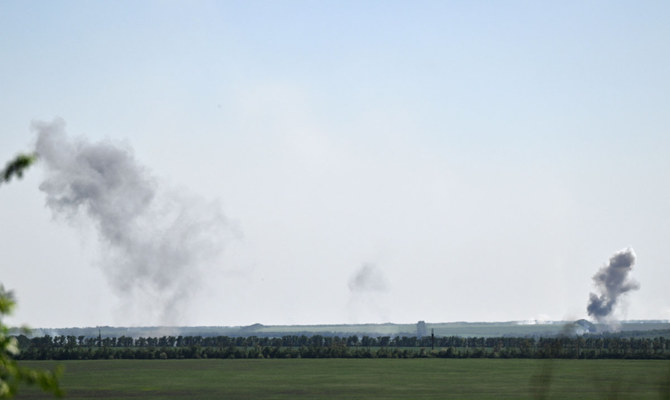
- Russia has made slow but steady advances since taking Avdiivka in February, with a string of villages in the area falling to Moscow’s forces
MOSCOW: Russian forces have taken control of the settlements of Soloviove in Ukraine’s eastern Donetsk region and Kotliarivka further north in the Kharkiv region, the defense ministry said on Monday.
Ukraine’s military made no mention of either locality in its evening General Staff report. Kharkiv Regional Governor Oleh Syniehubov said on Monday that Kotliarivka, located near the town of Kupiansk, was one of several locations to come under Russian shelling.
But Ukrainian bloggers appeared to acknowledge that both villages were in Russian hands.
DeepState, a popular forum on the war, noted on Saturday that Kotliarivka had been captured by Russian forces and on Sunday said the neighboring village of Kyslivka was also in Russian hands.
DeepState reported that Soloviove, northwest of the Russian-held town of Avdiivka, had been taken by Russian forces last week.
Russia has made slow but steady advances since taking Avdiivka in February, with a string of villages in the area falling to Moscow’s forces.
UNICEF warns 600,000 children face ‘catastrophe’ in Rafah
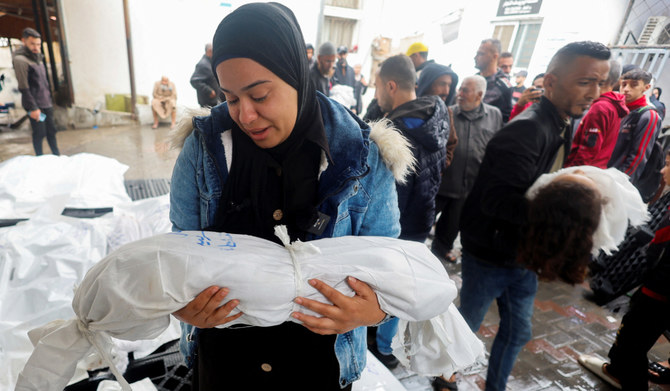
- Calling again for a ceasefire and safe access for humanitarian organizations, the agency highlighted there are some 78,000 infants under age two sheltering in the city, along with 175,000 children under five who are affected by infectious disease
- Israel has killed more than 34,000 Palestinians in Gaza, mostly women and children, according to the health ministry in the Hamas-run territory
NEW YORK: Some 600,000 children packed into Gaza’s Rafah city face “further catastrophe,” UNICEF warned on Monday, urging against their forced relocation after Israel ordered an evacuation ahead of its long-threatened ground invasion.
“Given the high concentration of children in Rafah ... UNICEF is warning of a further catastrophe for children, with military operations resulting in very high civilian casualties and the few remaining basic services and infrastructure they need to survive being totally destroyed,” the UN children’s agency said in a statement.
It said Gaza’s youth were already “on the edge of survival,” with many in Rafah — where the agency said the population has soared to 1.2 million people, half of them children — already displaced multiple times and with nowhere else to go.
“More than 200 days of war have taken an unimaginable toll on the lives of children,” said UNICEF Executive Director Catherine Russell.
“Rafah is now a city of children, who have nowhere safe to go in Gaza,” she said, warning that a large-scale military operation by Israel would bring “chaos and panic, and at a time where (children’s) physical and mental states are already weakened.”
UNICEF estimates that Rafah’s population has swelled to nearly five times its normal figure of 250,000 residents.
Calling again for a ceasefire and safe access for humanitarian organizations, the agency highlighted there are some 78,000 infants under age two sheltering in the city, along with 175,000 children under five who are affected by infectious disease.
Gaza’s bloodiest-ever war began following Hamas’s unprecedented Oct. 7 attack on Israel.
Israel has conducted a retaliatory offensive that has killed at least 34,735 people in Gaza, according to the Hamas-run
territory’s Health Ministry.
Of that toll, more than 14,000 are children, the ministry has said.
Israeli Prime Minister Benjamin Netanyahu has vowed to send ground troops into Rafah regardless of any truce, despite concerns from the US, other countries, and aid groups.
Hamas official Izzat Al-Rashiq said in a statement that any Israeli operation in Rafah would put the truce talks in jeopardy.
Senior Hamas official Sami Abu Zuhri said the evacuation order was a “dangerous escalation” that would have consequences.
“The US administration, alongside the occupation, bears responsibility for this terrorism,” the official said.
Hamas said later in a statement that any offensive in Rafah would not be a “picnic” for Israeli forces and said it was fully prepared to defend Palestinians there.
Aid agencies have warned that the evacuation order will lead to an even worse humanitarian disaster in the crowded coastal enclave of 2.3 million people reeling from seven months of war.
“Forcing 1 million displaced Palestinians from Rafah to evacuate without a safe destination is not only unlawful but would lead to catastrophic consequences,” British charity ActionAid said.
Nick Maynard, a British surgeon trying to leave Gaza on Monday, said in a voice message from the Gaza side of the Rafah crossing into Egypt: “Two huge bombs have just gone off immediately outside the crossing. There’s a lot of gunfire as well about 100 meters from us. We are very unclear whether we will get out.”
“Driving through Rafah, the tension was palpable with people evacuating as rapidly as they could.”
Witnesses said the areas in and around Rafah where Israel wants to move people are already crowded with little room for more tents.
“The biggest genocide, the biggest catastrophe, will take place in Rafah. I call on the whole Arab world to interfere for a ceasefire — let them interfere and save us from what we are in,” said Aminah Adwan, a displaced Palestinian.
Israel has been threatening to launch incursions in Rafah, which it says harbors thousands of Hamas fighters and potentially dozens of hostages.
Victory is impossible without taking Rafah, it says.
New York’s Columbia University cancels graduation ceremony as students remain defiant

- Pro-Palestinian protests put paid to event planned for May 15
NEW YORK: New York’s prestigious Columbia University has announced that it is canceling its main graduation ceremony, scheduled for next week, because of ongoing pro-Palestinian protests.
The announcement on Monday is the latest development in a movement that began nearly three weeks ago at Columbia and has swept college campuses nationwide.
The graduation ceremony had been scheduled for May 15 on the south lawn of the Manhattan campus, where protest encampments had been based before authorities dismantled them last week.
The Ivy League institution said it would “forego the university-wide ceremony” and hold a series of smaller events instead.
“We are determined to give our students the celebration they deserve, and that they want,” Columbia announced, saying “smaller-scale, school-based celebrations are most meaningful to them and their families.”
The university added: “We will focus our resources on those school ceremonies and on keeping them safe, respectful, and running smoothly. A great deal of effort is already underway to reach that goal.”
Students across the US have protested and set up tents at dozens of universities to register their opposition to the war in Gaza, while calling on President Joe Biden to do more to stop the bloodshed.
They have also demanded their institutions cease supporting companies that support Israel’s government.
Maya James, a psychology student at Columbia, told Arab News: “Seeing the university’s really insane response to student protests has brought so many people together, because I feel like most people on this campus can agree, including faculty, that students should not be penalized for expressing their First Amendment rights to protest, to petition, to do all of these things we’ve been encouraged to do for so long.”
She called on the university to give amnesty to students who had been suspended for expressing their First Amendment rights, which protect freedom of speech, the press, assembly, and the right to petition.
James also called on the university to disclose its investments because as “of right now there’s no visibility for us students to be able to know what the university is expected to do.”
She described the “vibes” at the protest sites as “absolutely remarkable,” with cultural and educational programs being offered and all kinds of activities being held.
She said the demonstrations were a continuation of Columbia’s long tradition of protest which began in the 1960s with its opposition to the involvement of the US in the Vietnam War.
James said it was “incredible” to see the solidarity for the Palestinian cause spread in campuses across the US, and people pushing to ensure “that we do indeed see a free Palestine within our lifetime and that our universities are no longer complicit in the genocide.”
Demonstrators have gathered on at least 40 US university campuses since April 17, often erecting tent camps to protest against the soaring death toll in the Gaza Strip. Nearly 2,000 people have been detained, according to the US media.
Police officers have forcibly ended several student sit-ins in recent days, including one at New York University at the request of its administrators.
Demonstrators had barricaded themselves inside Columbia, the epicenter of student protests in New York, and some complained about police brutality when officers cleared the faculty.
(With Agencies)
Taiwan must invest in building its own ‘strengths,’ vice president-elect says

- The United States is Chinese-claimed Taiwan’s most important supporter and arms supplier, despite the lack of diplomatic ties
TAIPEI: Taiwan is grateful for continued US security assistance but must invest in building its own “strengths” first and show the world its support for the island is worth it, Vice President-elect Hsiao Bi-khim said on Monday.
Hsiao, who takes office with President-elect Lai Ching-te on May 20, is Taiwan’s former de facto ambassador to Washington, and is expected to play a key role in further strengthening ties with the United States given her fluent English and deep ties in the US capital.
The United States is Chinese-claimed Taiwan’s most important supporter and arms supplier, despite the lack of diplomatic ties.
Speaking to a think-tank forum, Hsiao expressed appreciation for US President Joe Biden last month signing into law legislation to boost Taiwan’s defenses, part of a broader package of assistance for Ukraine and Israel.
“This bill demonstrates the US’ continuing commitment to supporting allies and partners in the face of geopolitical challenges,” she said.
“But beyond thanking our international friends for their support, it is important that as Taiwanese we invest in building our own strengths first,” she said.
“Through our own efforts in building a resilient Taiwan, we must have the confidence that Taiwan is worthy of galvanizing international support.”
China has ramped up its military pressure against Taiwan over the past four years. Taiwan’s government rejects Beijing’s sovereignty claims.
Hsiao and Lai — who have pledged to continue President Tsai Ing-wen’s defense self-sufficiency and modernization program — take power just months before the US presidential election in November.
Former President Donald Trump, whose administration strongly supported Taiwan and is the presumptive Republican candidate this time round, has said US allies like European members of NATO have to spend more on defense and not just rely on the United States shouldering the burden.
Trump has also been critical of US support for Ukraine following its invasion by Russia.




